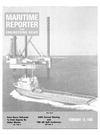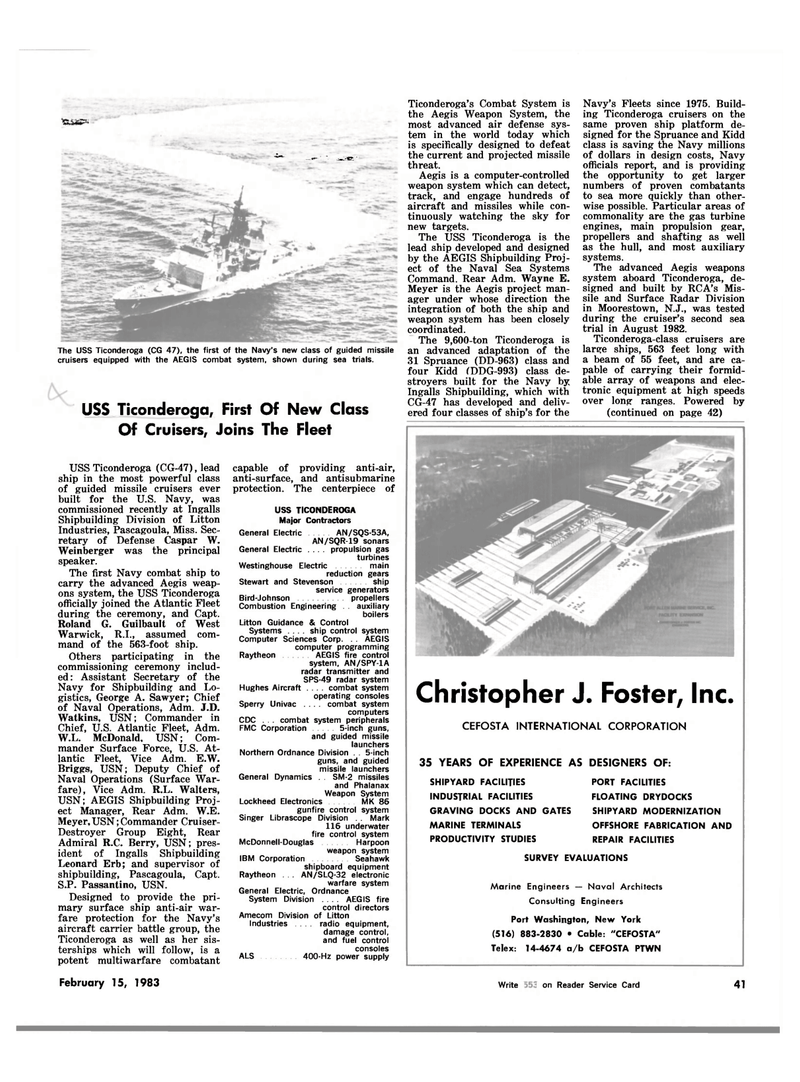
Page 37: of Maritime Reporter Magazine (February 15, 1983)
Read this page in Pdf, Flash or Html5 edition of February 15, 1983 Maritime Reporter Magazine
'mas* "i*- r- - „ -
The USS Ticonderoga (CG 47), the first of the Navy's new class of guided missile cruisers equipped with the AEGIS combat system, shown during sea trials.
USS Ticonderoga, First Of New Class
Of Cruisers, Joins The Fleet
USS Ticonderoga (CG-47), lead ship in the most powerful class of guided missile cruisers ever built for the U.S. Navy, was commissioned recently at Ingalls
Shipbuilding Division of Litton
Industries, Pascagoula, Miss. Sec- retary of Defense Caspar W.
Weinberger was the principal speaker.
The first Navy combat ship to carry the advanced Aegis weap- ons system, the USS Ticonderoga officially joined the Atlantic Fleet during the ceremony, and Capt.
Roland G. Guilbault of West
Warwick, R.I., assumed com- mand of the 563-foot ship.
Others participating in the commissioning ceremony includ- ed : Assistant Secretary of the
Navy for Shipbuilding and Lo- gistics, George A. Sawyer; Chief of Naval Operations, Adm. J.D.
Watkins, USN; Commander in
Chief, U.S. Atlantic Fleet, Adm.
W.L. McDonald, USN; Com- mander Surface Force, U.S. At- lantic Fleet, Vice Adm. E.W.
Briggs, USN; Deputy Chief of
Naval Operations (Surface War- fare), Vice Adm. R.L. Walters,
USN; AEGIS Shipbuilding Proj- ect Manager, Rear Adm. W.E.
Meyer,USN;Commander Cruiser-
Destroyer Group Eight, Rear
Admiral R.C. Berry, USN; pres- ident of Ingalls Shipbuilding
Leonard Erb; and supervisor of shipbuilding, Pascagoula, Capt.
S.P. Passantino, USN.
Designed to provide the pri- mary surface ship anti-air war- fare protection for the Navy's aircraft carrier battle group, the
Ticonderoga as well as her sis- terships which will follow, is a potent multiwarfare combatant capable of providing anti-air, anti-surface, and antisubmarine protection. The centerpiece of
USS TICONDEROGA
Major Contractors
General Electric AN/SQS-53A,
AN/SQR-19 sonars
General Electric ... propulsion gas turbines
Westinghouse Electric main reduction gears
Stewart and Stevenson ship service generators
Bird-Johnson propeller
Combustion Engineering . . auxiliary boilers
Litton Guidance & Control
Systems .... ship control system
Computer Sciences Corp. . . AEGIS computer programming
Raytheon AEGIS fire control system, AN/SPY-1A radar transmitter and
SPS-49 radar system
Hughes Aircraft .... combat system operating consoles
Sperry Univac .... combat system computers
CDC . . combat system peripherals
FMC Corporation 5-inch guns, and guided missile launchers
Northern Ordnance Division . 5-inch guns, and guided missile launchers
General Dynamics . . SM-2 missiles and Phalanax
Weapon System
Lockheed Electronics MK 86 gunfire control system
Singer Librascope Division Mark 116 underwater fire control system
McDonnell-Douglas Harpoon weapon system
IBM Corporation Seahawk shipboard equipment
Raytheon . . . AN/SLQ-32 electronic warfare system
General Electric, Ordnance
System Division .... AEGIS fire control directors
Amecom Division of Litton
Industries . . radio equipment, damage control, and fuel control consoles
ALS 400-Hz power supply
Ticonderoga's Combat System is the Aegis Weapon System, the most advanced air defense sys- tem in the world today which is specifically designed to defeat the current and projected missile threat.
Aegis is a computer-controlled weapon system which can detect, track, and engage hundreds of aircraft and missiles while con- tinuously watching the sky for new targets.
The USS Ticonderoga is the lead ship developed and designed by the AEGIS Shipbuilding Proj- ect of the Naval Sea Systems
Command. Rear Adm. Wayne E.
Meyer is the Aegis project man- ager under whose direction the integration of both the ship and weapon system has been closely coordinated.
The 9,600-ton Ticonderoga is an advanced adaptation of the 31 Spruance (DD-963) class and four Kidd (DDG-993) class de- stroyers built for the Navy by
Ingalls Shipbuilding, which with
CG-47 has developed and deliv- ered four classes of ship's for the
Navy's Fleets since 1975. Build- ing Ticonderoga cruisers on the same proven ship platform de- signed for the Spruance and Kidd class is saving the Navy millions of dollars in design costs, Navy officials report, and is providing the opportunity to get larger numbers of proven combatants to sea more quickly than other- wise possible. Particular areas of commonality are the gas turbine engines, main propulsion gear, propellers and shafting as well as the hull, and most auxiliary systems.
The advanced Aegis weapons system aboard Ticonderoga, de- signed and built by RCA's Mis- sile and Surface Radar Division in Moorestown, N.J., was tested during the cruiser's second sea trial in August 1982.
Ticonderoga-class cruisers are large ships, 563 feet long with a beam of 55 feet, and are ca- pable of carrying their formid- able array of weapons and elec- tronic equipment at high speeds over long ranges. Powered by (continued on page 42)
Christopher J. Foster, Inc
CEFOSTA INTERNATIONAL CORPORATION 35 YEARS OF EXPERIENCE AS DESIGNERS OF:
SHIPYARD FACILITIES
INDUSTRIAL FACILITIES
GRAVING DOCKS AND GATES
MARINE TERMINALS
PRODUCTIVITY STUDIES
PORT FACILITIES
FLOATING DRYDOCKS
SHIPYARD MODERNIZATION
OFFSHORE FABRICATION AND
REPAIR FACILITIES
SURVEY EVALUATIONS
Marine Engineers — Naval Architects
Consulting Engineers
Port Washington, New York (516) 883-2830 • Cable: "CEFOSTA"
Telex: 14-4674 a/b CEFOSTA PTWN
February 15, 1983 Write 2081 on Reader Service Card 41

 36
36

 38
38
